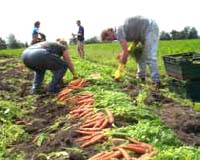 |
Havana (UPI) May 10, 2010 Cuba is considering foreign -- possibly Brazilian -- buyout of its troubled sugarcane industry after the worst harvest in more than a century cost a minister his job and led to recrimination and government threats to punish other officials suspected of poor performance. The upheaval over the sugar harvest began as statistics of the sector's poor yields reached President Raul Castro's ear. News of the sugarcane industry's woes had circulated for some time but failed to make it to the state-controlled media. Then Granma, the Communist Party daily newspaper, broke the news that the yield was the worst since 1905, but only after the senior official responsible, Luis Manuel Avila Gonzalez, was dismissed from his post as sugar minister. Jorge Luis Sierra Cruz, minister of transport and vice president of the Council of Ministers, was also sacked, Granma said, quoting an official note. Neither of the officials will lose official privileges, however, and will be assigned other posts. The duties of Jorge Luis Sierra Cruz will be taken over by two people. Antonio Enrique Lusson Batlle, a veteran member of the Central Committee of the Communist Party, takes over as vice president of the council of ministers, though it isn't certain if he will give up responsibilities for renovating the railroad system. The new minister of transport, Cesar Ignacio Arocha Masid, was previously in charge of bulk food transport. Orlando Celso Garcia Ramirez becomes the new sugar minister. Officials quoted in the media said Castro would no longer protect officials if they were found to be wanting in their performance. It warned that mistakes blamed on the weather or other external factors wouldn't be tolerated. With the two officials gone and replaced by new people, albeit all members of the ruling communist elite, the sugarcane industry's severe difficulties are nowhere near resolution. The Granma report, reflecting government opinion, said the Sugar Ministry had failed to implement changes that were needed to address chronic problems. Details of the difficulties facing the sugarcane industry weren't revealed but the newspaper said the both the ministry and industry sectors under its control suffered from poor planning. It cited a chronic failure to project key developments in the transition from sugarcane plantation to harvesting and transportation. Cuba's harvest in 2009 suffered a major shortfall. The actual yield was more than 850,000 tons short of the official forecast, after a period of relative growth that lasted from 2005-08. Industry analysts said the problem began after the government embarked on a major reorganization of the industry in 2002 that went on for more than two years. The state-led reforms reduced the number of refineries from about 160 to 61 but also laid off more than 100,000 people. Although Cuba produced 1.4 million tons of sugar in the 2008-09 season, earning more than $600 million from exports, that figure was less than one-fourth of crop yields before the Castro takeover. Brazil's dramatic success with its sugarcane crop and diversification into producing biofuels has drawn Cuba to the possibility of involving Brazil in some form or other, including investment and management of parts of the industry.
Share This Article With Planet Earth
Related Links Farming Today - Suppliers and Technology
 Organic Farming Shows Limited Benefit To Wildlife
Organic Farming Shows Limited Benefit To WildlifeLeeds, UK (SPX) May 06, 2010 Organic farms may be seen as wildlife friendly, but the benefits to birds, bees and butterflies don't compensate for the lower yields produced, according to new research from the University of Leeds. In the most detailed, like-for-like comparisons of organic and conventional farming to date, researchers from Leeds' Faculty of Biological Science found that the benefits to wildlife and incre ... read more |
|
| The content herein, unless otherwise known to be public domain, are Copyright 1995-2010 - SpaceDaily. AFP and UPI Wire Stories are copyright Agence France-Presse and United Press International. ESA Portal Reports are copyright European Space Agency. All NASA sourced material is public domain. Additional copyrights may apply in whole or part to other bona fide parties. Advertising does not imply endorsement,agreement or approval of any opinions, statements or information provided by SpaceDaily on any Web page published or hosted by SpaceDaily. Privacy Statement |